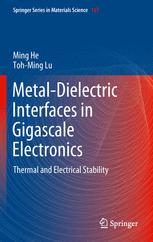

Most ebook files are in PDF format, so you can easily read them using various software such as Foxit Reader or directly on the Google Chrome browser.
Some ebook files are released by publishers in other formats such as .awz, .mobi, .epub, .fb2, etc. You may need to install specific software to read these formats on mobile/PC, such as Calibre.
Please read the tutorial at this link: https://ebookbell.com/faq
We offer FREE conversion to the popular formats you request; however, this may take some time. Therefore, right after payment, please email us, and we will try to provide the service as quickly as possible.
For some exceptional file formats or broken links (if any), please refrain from opening any disputes. Instead, email us first, and we will try to assist within a maximum of 6 hours.
EbookBell Team

5.0
70 reviewsMetal-dielectric interfaces are ubiquitous in modern electronics. As advanced gigascale electronic devices continue to shrink, the stability of these interfaces is becoming an increasingly important issue that has a profound impact on the operational reliability of these devices. In this book, the authors present the basic science underlying the thermal and electrical stability of metal-dielectric interfaces and its relationship to the operation of advanced interconnect systems in gigascale electronics. Interface phenomena, including chemical reactions between metals and dielectrics, metallic-atom diffusion, and ion drift, are discussed based on fundamental physical and chemical principles. Schematic diagrams are provided throughout the book to illustrate interface phenomena and the principles that govern them.
Metal-Dielectric Interfaces in Gigascale Electronics provides a unifying approach to the diverse and sometimes contradictory test results that are reported in the literature on metal-dielectric interfaces. The goal is to provide readers with a clear account of the relationship between interface science and its applications in interconnect structures. The material presented here will also be of interest to those engaged in field-effect transistor and memristor device research, as well as university researchers and industrial scientists working in the areas of electronic materials processing, semiconductor manufacturing, memory chips, and IC design.